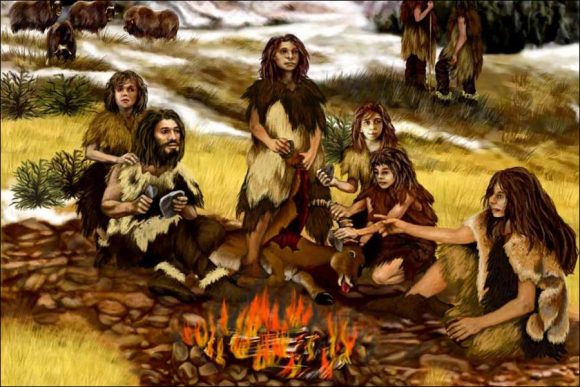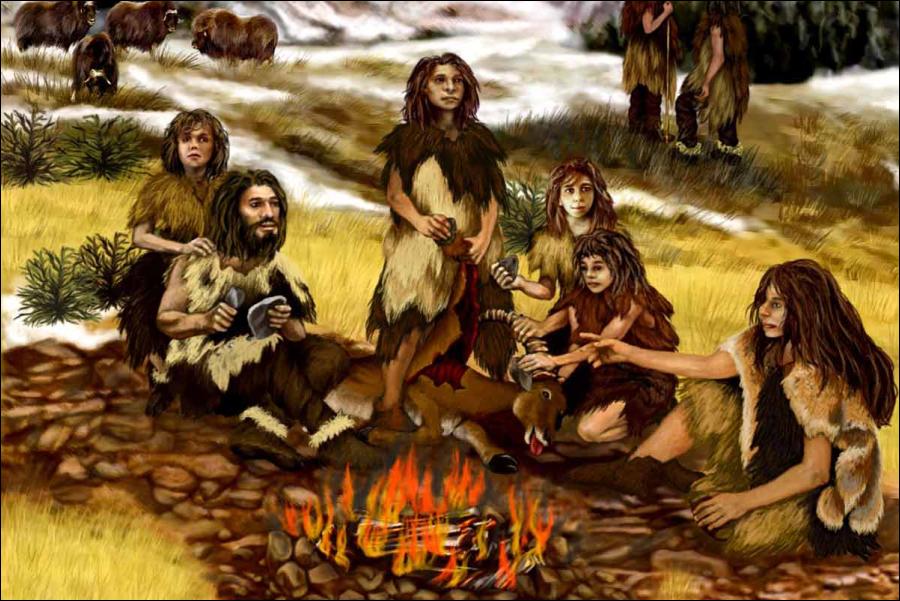Fire is of great importance in human evolution. First of all, let’s take a look at the history of fire with you: The earliest fire remains ever discovered belong to the Middle Ordovician Period, 476 million years ago, when the plants invading the land were burned. This date is important because before this time the oxygen content in the atmosphere was very low and did not allow burning easily.
In fact, there was no intense accumulation of flammable substances in the land, so the flaming combustion reaction was not very common. However, when the land began to be occupied by plants and oxygen levels reached 13% and above, that’s when we started to come across traces of flaming reactions and even fires spread over large areas. The first large-scale fire remains discovered belong to the Late Silurian Circuit, 420 million years ago. After these times, burning reactions were observed in every period.
Humans, who appeared on the stage of history as a species that evolved quite late, were the only species that could consciously control fire. This makes the fever more meaningful for us. Although other species may evolve with fever, no other animal species capable of consciously controlling fever could be identified. The Australian fire hawk, for example, is aware of the concept of fire and is fed by hunting animals escaping from flames, especially in areas of fire. Plants such as Long Leaf Pine, which are found in abundance in the USA, cannot germinate without flame.
Therefore, while fires destroy many living things on the one hand, they also bring life to life that has evolved in parallel with the fire that we often see in the evolutionary process. However, no species, food preparation, agriculture, protection from hunters to hunt, from processing materials to health, from chemical studies to warm up, religious concepts, cave paintings, art, philosophy and many other subjects can not perceive and use fire as comprehensive as we can not perceive and use. This is one of the important consequences of the evolution of our brain. What we want to talk about here is at which point the evolution of human species is able to control fire.
Unfortunately, there is no definite judgment on this issue. To be clear, the fever was controlled by Homo erectus about 400,000 years before today. About 125,000 years ago, we know that many different species of humans can clearly control fire. However, some scientists claim that the control of fire goes back to 1.7 million years ago. Obviously, these allegations are often refuted or denied, because the evidence for the control of fever during these periods is either too vague or fraudulent. Therefore, the scientific community is very sensitive and meticulous. Fires, even on a small scale, are very common and extremely frequent, leaving many traces that may confuse researchers. The important thing is to determine which of these traces really belong to a controlled fire.
Since the findings on the control of fever are uncertain, we will not go into the discussions here much. But roughly 400,000 years ago, we could say that our ancestors controlled the fire when there was no trace of the Homo sapiens species. How did this affect our evolution? What does fever control have to do with our evolution?
Control of Fire and Human Evolution
The first effects of fever control are thought to be behavioral. Because a controlled fire means that people can create light whenever they want. Thus, a human being, a daytime animal, does not have to limit its activities to daylight. Moreover, the discovery that predators (such as predatory cats) and disturbing guests (many insects and invertebrate species) used to be afraid of fire were beginning to give a very serious evolutionary advantage.
Aside from all this, fever has helped people to cook nutrients that are difficult to digest at a time when they are increasingly carnivorous (from the predominant fruit diet to a omnivorous diet shifting to carnivores) and accelerating brain evolution. The change in the type of nutrition is one of the most important characteristics that affect the evolutionary change of a species. Especially if a food cooked on fire contains starch-based carbohydrates, these chemicals break down under the influence of fire and people can digest these products more easily. In this way, they obtain a much more efficient and high energy source. This is why they have made significant contributions to their evolutionary economies. So their evolutionary paths begin to change unexpectedly.
A misunderstanding is often made here: the control of the fire and the way we cook our food is presented as if it were only related to meat products. This is a serious mistake. Even if human beings have switched from a fruitful diet to an omnivorous diet during the evolutionary process, this does not mean that they avoid green nutrition or that such nutrition has ended.
On the contrary, thanks to the control of fire, hundreds of thousands and millions of years have been able to consume some herbal products that have not been digested. Because even though we can digest the flowers, seeds and fleshy fruits made of simple sugars and carbohydrates; we could not digest plant stems, adult leaves, enlarged roots and plant tubers, especially raw cellulose, as our appendix dulled in the evolutionary process. However, thanks to the fire, we started to digest these parts of the plant and partially digest the cellulose and digest it to some extent. Moreover, some seeds and plant parts, which are poisonous in their raw form, can be made nontoxic by cooking over fire. This has had a serious impact on our diet and almost led our evolutionary process.
Although some scientists claim that fever does not affect the evolution of the human brain, the overwhelming majority of evolutionary biologists say that this is not true, that fever directly affects our diet, that our diet directly affects our evolutionary change, and therefore fever plays an important role in our evolution. So much so that, due to the change in our nutritional type, not only did our brain grow larger, but also our face and jaw structure began to change. Even the presence of 20 years old teeth, the most prominent vestigial organs in our body, is enough to show this situation.
In all its aspects, it is possible to see that fire is very important for human evolution. Even if we assume that it does not affect our diet, it would not be wrong to say that it has very serious behavioral effects and therefore directly affects our evolutionary advantages.
Views: 979




